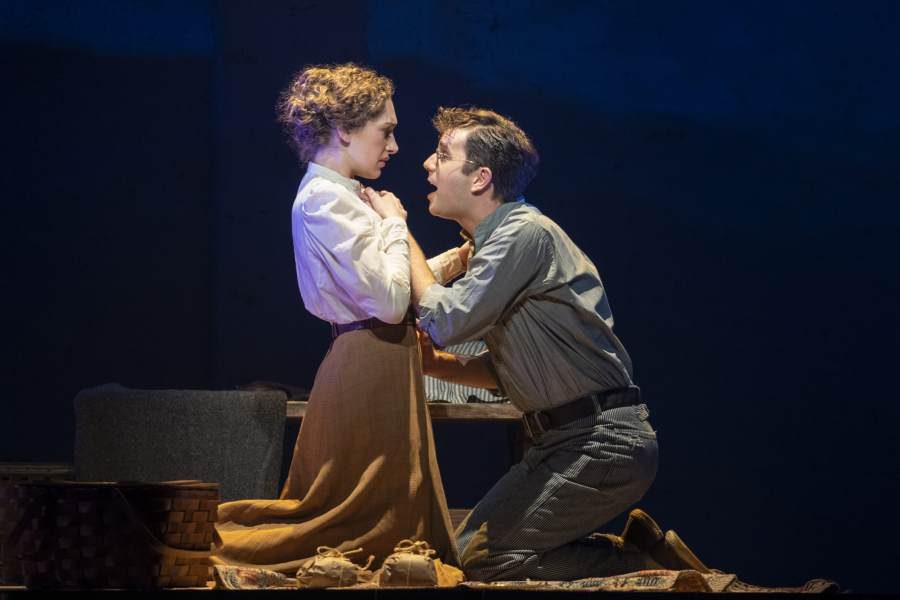
 photo by Joan Marcus
photo by Joan Marcus
Most shows on Broadway begin with an announcement reminding the audience to turn off phones and recording devices. The revival of the musical “Parade” begins with a recorded message from Reverend Warnock, Senator from Georgia. Interesting way to start…
City Center Encores presented a revival of the show that was so well- received, it moved to Broadway. Having seen “Parade” years ago, I was a little surprised by the reviews. Undoubtedly, the current political climate has added to interest in the show. In fact, while it was in previews, a group of White Nationalists protested outside the Bernard B. Jacobs Theatre, ironically creating publicity for the musical.
“Parade” begins and concludes on Confederate Memorial Day, though years apart. Leo Frank, a transplanted New Yorker, living and working in Georgia, wonders why Georgians celebrate when they lost the war. Conscientious and hardworking, Frank is going to the pencil factory where he is the superintendent, even though it’s closed for the day.
There are moments in the show that cause the audience to chuckle. Frank (Ben Platt) complains about the tribulations of being Jewish in the South. I found it hard to laugh; the ache in the pit of my stomach about the eventual ending kept me from finding anything in the show funny. Being Jewish in Georgia in 1913 made Frank an outsider and the ‘other.’ Eventually it would make it easier for others to demonize him.
Based on a tragic time in American history, the play, with music and lyrics by Jason Robert Brown and directed by Michael Arden, tells of a murder of a young girl, Mary Phagan who worked at the pencil factory and the man accused of killing her. The show deals with politics, ambition and religious bigotry. People are coerced into lying, while others profit from the case. In fact, the DA who tried the case eventually was elected governor.
The cast is large and generally excellent with a few standouts. Alex Joseph Grayson is ex-con Jim Conley who lies, saying that he helped Frank move the girl’s dead body. (History suggests Conley might have actually committed the murder .) Jay Armstrong Johnson plays an unscrupulous reporter who sees the case as a way to build his reputation and Paul Alexander Nolan is the DA, coercing and coaching witnesses so he can win his case and advance politically.
The characters are all real and their photos flash onto the screen behind the platform on stage where most of the action occurs. (Projection designer Sven Ortel) As viewers, we assume that the script is historically accurate, yet I wish that Frank had been portrayed as a more sympathetic person. He’s stiff-necked and a bit arrogant and cold. Even the song Platt sings about his personality doesn’t make us warm up to him. Platt sings beautifully with much passion. His acting is less skilled and even as he’s about to be hanged and recites the Shema, he evokes little feeling. The true heroine and the one with whom we empathize is his wife Lucille played with warmth and heart by Michaela Diamond. We care about her and applaud her bravery. Diamond gives a performance that will bring her a Tony Award nomination.
Most of the evidence against Frank is circumstantial. Three young girls who worked with Mary claim that Frank 'looked at them’ and made them uncomfortable. Other witnesses are threatened by the DA unless they can ‘recall’ something to help his case. Although there was another suspect, a Black night watchman, he feels that there’d been too many lynchings of Black men.
The setting (scenic design by Dane Laffrey) is a three-tiered set of wooden platforms surrounded by benches and chairs. The cast remains onstage the entire time, to remind us that they are all complicit.
The music carries the show but is too shrill, almost opera-like at times in lieu of dialogue. There are two duets between the Franks that are the musical highlights of the show, but several songs by Brown do little to advance the story. Then too is the length of the show. “Parade” begins with a beautifully sung song by a young Confederate soldier leaving his girl then moves onto 1913. It ends with the US entry into WWI. Unless the goal is to make the state of Georgia a character with its politics and patriotism, these additions just made the show unnecessarily long.
The voices are beautiful and the actors play their parts well but my problems are with the script. At the end when Frank is lynched, the scene feels rushed. Predictably, Frank begins praying in Hebrew, again a reminder that he was Jewish.
With cases of anti-Semitism on the rise and an increase of incidents in every state, Frank’s tragic case is a reminder that bigotry and hatred is not new. When he’s about to be hanged, he comments upon how he must have been chosen for a reason. As a result of his death, the ADL was formed. (Could that have been the reason?)
Even with the rope around his neck as he is about to be lynched, Frank proclaims his innocence. As I mulled over the play, I realized that the play still leaves us with doubt. In fact, even today, although Frank has been pardoned posthumously, he has not officially been absolved of the crime.
Yet he was a victim, as much as Mary. The events occurred in 1913 yet tragically so much remains the same. We are supposed to learn from history but have we?
Bernard B. Jacobs Theatre
242 W.45 Street
New York, NY